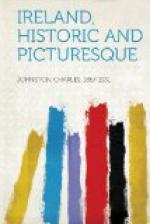“We are rounding Moy-n-Olurg,
we sweep by its head and
We plunge through the Foyle,
Whose swans could enchant with their music the
dead and
Make pleasure of toil....
Oh, Erin, were wealth my desire, what a wealth
were
To gain far from thee,
In the land of the stranger, but there even health
were
A sickness to me!
Alas for the voyage, oh high King of Heaven,
Enjoined upon me,
For that I on the red plain of bloody Cooldrevin
Was present to see.
How happy the son is of Dima; no sorrow
For him is designed,
He is having this hour, round his own Kill in
Durrow,
The wish of his mind.
The sound of the wind in the elms, like the strings
of
A harp being played,
The note of the blackbird that claps with the
wings of
Delight in the glade.
With him in Ros-grenca the cattle are lowing
At earliest dawn,
On the brink of the summer the pigeons are cooing
And doves on the lawn....”
In another measure, he again mourns his exile: “Happy to be on Ben Edar, before going over the sea; white, white the dashing of the wave against its face; the bareness of its shore and its border....
“How swiftly we travel;
there is a grey eye
Looks back upon Erin, but it no more
Shall see while the stars shall endure in the
sky,
Her women, her men, or her stainless shore....”
This great-hearted and impetuous exile did not waste his life in useless regrets. Calling forth the fire of his genius, and facing the reality of life, he set himself to work, spreading the teaching of the New Way among the Picts of the north—the same Picts who, in years gone by, had raged against the barrier of Hadrian between Forth and Clyde. The year of his setting out was 563; the great center of his work was in the sacred isle of Iona, off the Ross of Mull. Iona stands in the rush of Atlantic surges and fierce western storms, yet it is an island of rare beauty amid the tinted mists of summer dawns. Under the year 592, a century after Saint Patrick’s death, we find this entry in the Chronicle: “Colum Kill, son of Feidlimid, Apostle of Scotland, head of the piety of the most part of Ireland and Scotland after Patrick, died in his own church in Iona in Scotland, after the thirty-fifth year of his pilgrimage, on Sunday night, the ninth of June. Seventy-seven years was his whole age when he resigned his spirit to heaven.” The corrected date is 596.
We can see in Colum of the Churches the very spirit of turbulence and adventure, the fierce impetuosity and readiness for dispute, which led to the contests between the chieftains of Ireland, the wars between province and province, often between valley and valley. It is the same spiritual energy, working itself out in another way, transmuted by the sacred fire into a divine mission. In the same way the strong will of Meave, the romantic power of Deirdre and Grania, transmuted to ideal purposes, was the inspiration of Saint Brigid and so many like her, who devoted their powers to the religious teaching of women.




